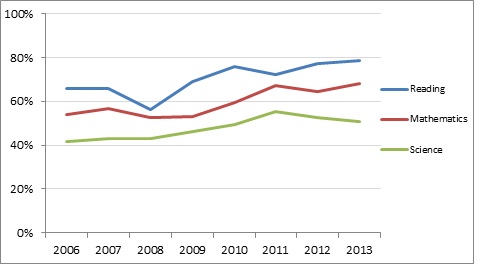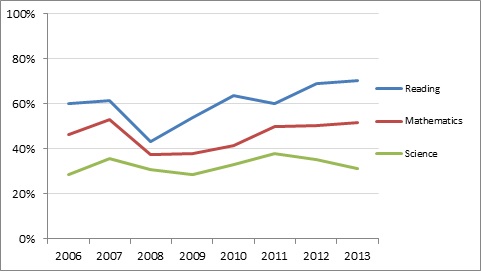- Editors in Cleveland have changed their tune a bit after living with the governor’s K-12 budget proposals for a week. They opine that the new formula still “makes some sense” as they understand it, but say that help for poorer districts “should not come at the expense of often struggling suburban districts that are just climbing out of the Great Recession.” (Cleveland Plain Dealer)
- Editors in Toledo are opining from the same hymnal as those in Cleveland re: the governor’s proposed funding formula changes. (Toledo Blade)
- Elyria Schools’ superintendent has spoken up in support of his “rock star” teacher, who as we told you yesterday is leaving teaching, citing standardized testing and Common Core as the reason. Paul Rigda says, “When you have great teachers, hard-working teachers, nationally board-certified teachers questioning the legitimacy of these tests, then there may be some problems.” He goes on to cite the state supe’s recent report on testing as a good place to start the high level conversations that he says need to happen. (NorthCoast Now)
- In blink-and-you-missed-it action, the House Education Committee yesterday recommended the “PARCC test safe harbor” HB 7 to the full House. There could be a vote as early as today, even though as a number of commentators in the piece note, the bill’s provisions are “largely symbolic”. (Cleveland Plain Dealer)
- The state board of education yesterday got a preview of what “education deregulation” might look like – that is, what rules and requirements high-performing districts may be exempt from if the provisions in SB3 become law. The Plain Dealer’s piece includes discussion of SB3 and some similar provisions which will likely be proposed in the governor’s budget. (Cleveland Plain Dealer)
- Sponsor testimony on SB3 was heard in Senate Education Committee yesterday. This is a fairly preliminary discussion until the governor’s provisions are more clear, but expect to hear much more about this one going forward. (Gongwer Ohio)
- Youngstown City Schools, as predicted a while back, has replaced its two appointed representatives on the academic distress commission charged with improving student achievement in the district. While the Vindy reporter spends some time complaining about Sunshine Law violations, important issues such as what the new members may bring to the table and what’s up with the school board president’s spellcheck go unexplored. (Youngstown Vindicator)
RESEARCH BITES: SCIENCE AND LOW-INCOME STUDENTS (PART II)
Science proficiency for economically disadvantaged (ED) students is extremely low in Ohio, particularly for children living in large urban areas. On Monday, we observed 8th grade proficiency rates for ED students in Cincinnati, Cleveland, and Columbus to be around 30 percent (in comparison to 70 percent for all students statewide). In this post, I look at science proficiency-rate trends in comparison to reading and math. Based on the achievement data on these charts, it does look like schools serving ED students might be making stronger efforts to raise math and reading achievement, possibly to the neglect of science.
1. Statewide 8th grade proficiency (ED students) in reading, math, science
Reading and math proficiency show a positive trend across the state for ED students. Science is also mostly positive, but the gains are somewhat smaller (mostly due to a fall-off from 2010-11 to 2013-14).

2. Columbus City Schools (CCS) 8th grade proficiency (ED students) in reading, math, and science
In the case of CCS, reading and math scores are on an upward trend (more so in reading), but science proficiency has clearly languished.


